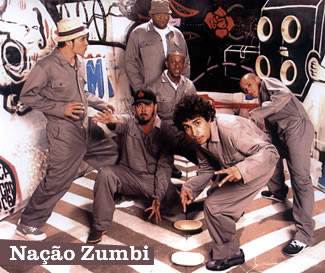
A Conversation with CéU
(continued)
PM: Now, it's really amazing that on the World Beat chart that your record knocked the Irish women off the number one spot for the first time in years. That's incredible! I mean, first of all, that the number one spot was Irish for that long. I didn't know that.
C: Uh-huh.
[laughter]
PM: And it's like soccer, the Brazilians knock the Irish off, that's like soccer or something.
C: Yeah, it is interesting.
PM: I got a laugh out of that. How important was the Starbucks thing in getting over in America? Was that very significant, hooking up with them?
C: Well, what I think about the deal with Starbucks is that they helped me to show my work a lot, because they started this huge distribution in America, right?
PM: Sure.
C: And there is a Starbucks on every corner, so--
PM: [laughs]
C: --yeah, and it's interesting because I think the biggest problem, especially in Brazil, is distribution.
PM: Distribution.
C: Yeah. So for me, I see that Starbucks is a great opportunity to show the work.
PM: Yes, absolutely.
C: It's really a great opportunity.
PM: And I think the more that places like Puremusic and print magazines catch on to your great music, the faster it will spread. I really hope you get a big push, because your music is so incredible; I just love it.
C: Thank you so much, Frank.
PM: That's a beautiful cover of "Concrete Jungle" on your record. It's so hip, and it's so enlightened. Does his music, Bob Marley's music, mean a lot to you?
C: Yes, yes. And I was worried about recording a Bob Marley song, and such a classic song. I used to sing it a lot, this song. And this song talks about the reality of Kingston, the reality of Marley. But I can totally substitute the reality of Sao Pãulo, too, as it is a concrete jungle, a chaotic place with a lot of pollution. And it also reflects my reality, of course, with a different point of view. But it works also.
And I think when you write a song it's to sing in whatever place it's sung in. I think the song just has to fly, and music is from the universe, it's not something that, oh, no, I won't record that song because it's Marley. I think Marley maybe would be happy to see a girl that loves his music and loves Jamaican music wants to sing his "Concrete Jungle." So I asked these guys from Brazil, because they're the best band in Brazil, and actually my favorite band ever, called Nação Zumbi--or in English, Zombie Nation.
PM: Ah.
C: And I asked them, and they agreed to play with me. And they are playing on this track. So yeah, I love the result.
[You might enjoy watching a video of CéU joining Nação Zumbi live.]

PM: Now, explain to me, if you will, how is it with Latin music, through Central and South America. What I mean is, is the music of Brazil, the traditional or the modern, is it popular throughout other countries in Central and South America, or only in certain ones?
C: You mean is our traditional music is popular in Mexico, or--
PM: For instance, right. Like the modern or the traditional, like the scene in Brazil, is it popular in Mexico? Is it popular in Ecuador?
C: No, it's not. It's so strange, because we are so close, but so far.
PM: It doesn't translate, does it?
C: Right. It doesn't translate.
PM: Culturally.
C: Yeah. So it's strange. I don't understand exactly why, but it is like this.
PM: So in a way it translates culturally more easily to America, or to Holland, than it does to Ecuador?
C: Maybe because it's possible to go to America. It's kind of hard to get through this barrier. It's really hard to have money to get your band into Ecuador. We don't have the structure.
PM: No bridge.
C: Yeah.
PM: Because there are all these people in America or in France that will book the act that will give you the gigs, and so you can go play.
C: Yeah, yeah.
PM: Right. And to get one even in Argentina, it's a whole different thing, right.
C: Yes, it is. It is. continue
print (pdf) listen to clips puremusic home